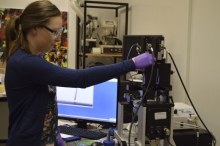
University:
Major:
Mentor(s):
Faculty Sponsor(s):
Faculty Sponsor's Department:
Project Title:
Project Description:
<p>Conventional adhesives routinely fail when utilized in wet conditions, a problem that frustrates engineers and consumers in equal measures. The ability of marine organisms to strongly adhere to a variety of surfaces in adverse and turbulent tidal conditions has inspired the development of synthetic materials based on the selective assembly and functional groups of natural systems. Dopa (3,4-dihydroxyphenylalanine), a catecholic residue abundant in mussel foot proteins, is a key chemical functionality in the effective adhesion of mussels. Catecholic siderophores - bacterial iron chelators - and their synthetic counterparts exhibit similar adhesive abilities. Recent work has shown that marine mussel proteins and siderophores perform as robust underwater adhesives between model mineral surfaces. In this work Quartz Crystal Microbalance is used to examine the adhesion of synthetic siderophores on hydroxyapatite, AlO2 and SiO2. Initial results demonstrate that these molecules can adsorb and bind to these diverse surfaces, and small changes in molecular structure can lead to large changes in binding efficiency. Thus synthetic models can be molecularly designed for optimal adhesion based on these findings. Moving forward, we aim to gain a more detailed understanding of how molecular structure impacts adsorption efficiency, which may enable the development of biomimetic adhesives for industrial and medical applications by providing molecular design rules.</p>
